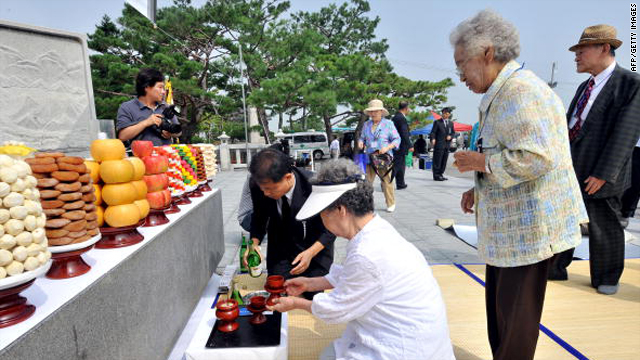Scammer
Banned

Elderly South Koreans, who were separated from their families during the 1950-53 Korean War, hold a traditional ritual for their deceased relatives at Imjingak peace park in Paju in North Korea, near the inter-Korea border, on September 14.
South Korea will push North Korea for monthly reunions of families separated by the Korean War nearly 60 years ago, the Yonhap news agency reported Tuesday.
Seoul was to make its pitch during talks between the two Koreas on Tuesday. Pyongyang has proposed discussing "humanitarian issues" at the two-day talks in the border town of Kaesong, Yonhap said.
The South has rejected tying the family reunions to possibly resuming cross-border tours, which the North has repeatedly sought. Seoul stopped the tours to the Mount Kumgang resort after a North Korean soldier killed a South Korean tourist in 2008. Before that, the tours had earned Pyongyang millions of U.S. dollars over a decade.
At Tuesday's talks, the South also might push for the use of letters and videos for separated families unable to meet face-to-face, Yonhap said. The news agency cited remarks made by Kim Yong-hyun, head of the South Korean delegation, before he left for the talks.
They come ahead of family reunions slated for October 30 to November 5 at Mount Kumgang, the two countries' joint mountain resort in the North. Those reunions are to involve 100 people from each side.
Such reunions have happened sporadically since 2000, when the North and South held their first summit. Fewer than 21,000 family members have reunited since. About one-fifth of them have reunited via video.
The 1950-53 Korean War ended in a truce, but without a formal peace treaty. More than 80,000 South Koreans await an opportunity to reunite with loved ones, Yonhap said.
About 10,000 people applied to take part in a similar reunion last year, but fewer than 200 families were allowed to participate.
Family members wept as they saw one another for the first time in decades at the 2009 event. No mail, telephone or e-mail exchanges exist between ordinary citizens across the Korean border.
The families were allowed to spend a few days together before the South Koreans had to return home.
